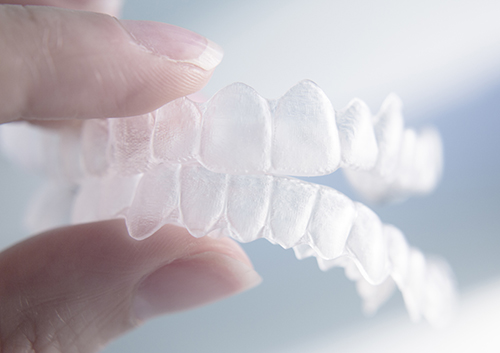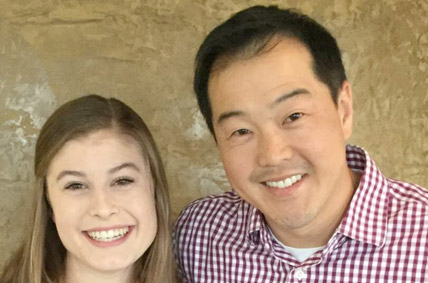Five “Don’ts” When You Wear Aligners
March 10th, 2021

Choosing clear aligners was a great decision on your part! Straight teeth and a healthy bite? Subtle, almost invisible aligners? 3D technology custom-designed just for you? All the positives we’ve come to expect from your choice of orthodontic treatment.
So, don’t sabotage your good work! Here are five negative habits that will prevent you from getting the most out of your aligners:
- Don’t forget to keep them clean
One of the reasons you chose clear aligners is because they are nearly invisible. But careless cleaning habits can leave them discolored, scratched, or cloudy. Soaking in colored mouthwash can stain aligners. Using abrasive cleaning products or brushing with a heavy hand can cause scratches. And failing to keep aligners clean can lead to a buildup of cloudy plaque. Talk to us! We know all the best products and practices to keep your aligners their most sanitary—and most invisible.
- Don’t eat with your aligners in place
Aligners are simply not meant to be used while you eat. Chewing puts too much stress and pressure on them, and can lead to aligner damage and even breakage. Because you will be wearing your aligners for most of the day, planning ahead for your meals is key. One bonus: it’s a great way to eliminate unconscious snacking.
- Don’t let foods or drinks stain your aligners
It’s great that you take your aligners out to eat, but do you remember to brush before you replace them? Foods like spaghetti sauce and blueberries that stick to your enamel can stain your aligners. And it’s always best to remove your aligners before drinking a beverage. If a drink can stain your teeth, it can stain your aligners. Red wines, dark juices, colas, and, of course, coffee and tea can cause discoloration. Another thing to consider? Food particles in the trays can not only stain your aligners (and your enamel), but keep your teeth in contact with the acids and sugars that lead to cavities.
- Don’t run hot
Aligners are formed using heat, so it makes sense that heat can de-form them as well. Drinking hot beverages with your aligners in place can change their shape—and even subtle changes will affect your progress. Since warped aligners might have to be replaced, save the piping hot beverages for those times you’re not wearing aligners. It’s best not to clean them with very hot water as well.
- Don’t forget to wear them
Aligners need to be worn approximately 20-22 hours each day. If you’re not putting in the required time, you’re delaying your progress. If you’re having trouble with scheduling meals or activities, talk to Dr. Quas, Dr. Wiater and Dr. Kang when you visit our Bend, Redmond, Prineville, La Pine or Sisters OR office. We have suggestions.
But let’s not just dwell on the negatives. We like to focus on the positive, too, so here’s the one item on your “Do List” that will absolutely make your aligner experience the best it can be:
Do follow our recommendations!
Clean your aligners with the proper tools and products—and clean your teeth and aligners after every meal and snack. Remember that water is the only guaranteed problem-free beverage. Don’t expose aligners to heat or eat with them in place, because they can be warped or damaged. And be sure to wear them as long as you need to each day—this will keep your treatment on track and on schedule.
Enjoying a future filled with beautiful, healthy smiles? That’s not just a positive—it’s a happily-ever-after!










 Website Powered by Sesame 24-7™
Website Powered by Sesame 24-7™